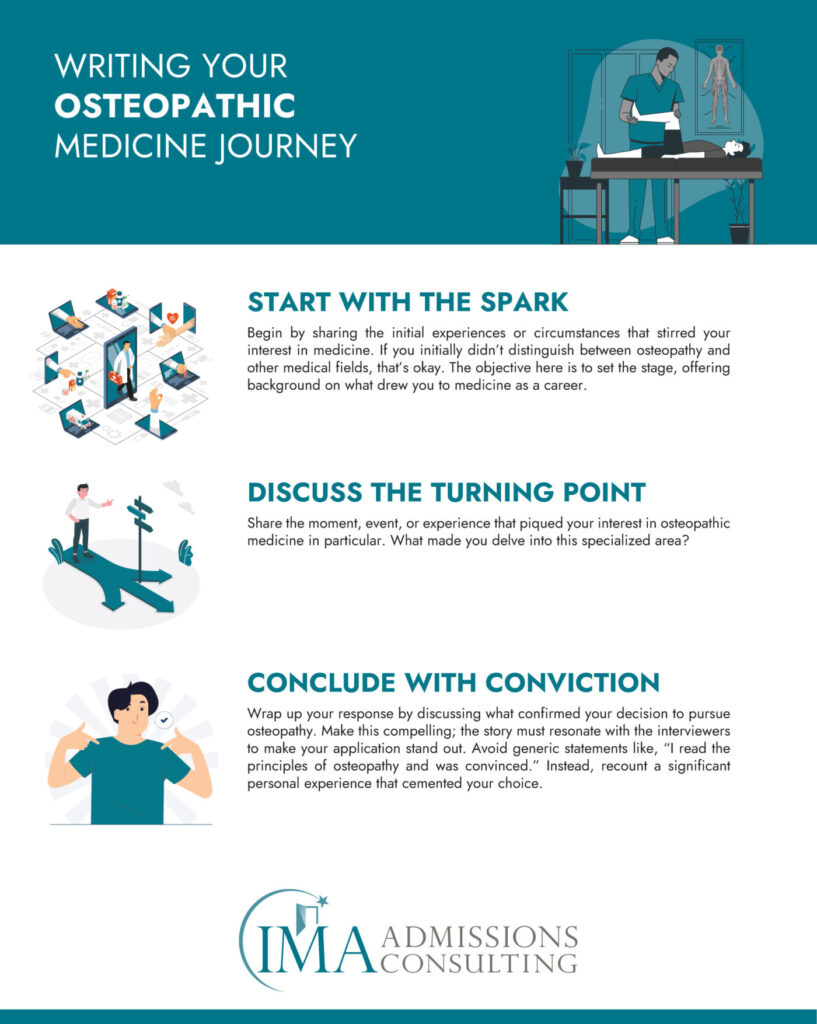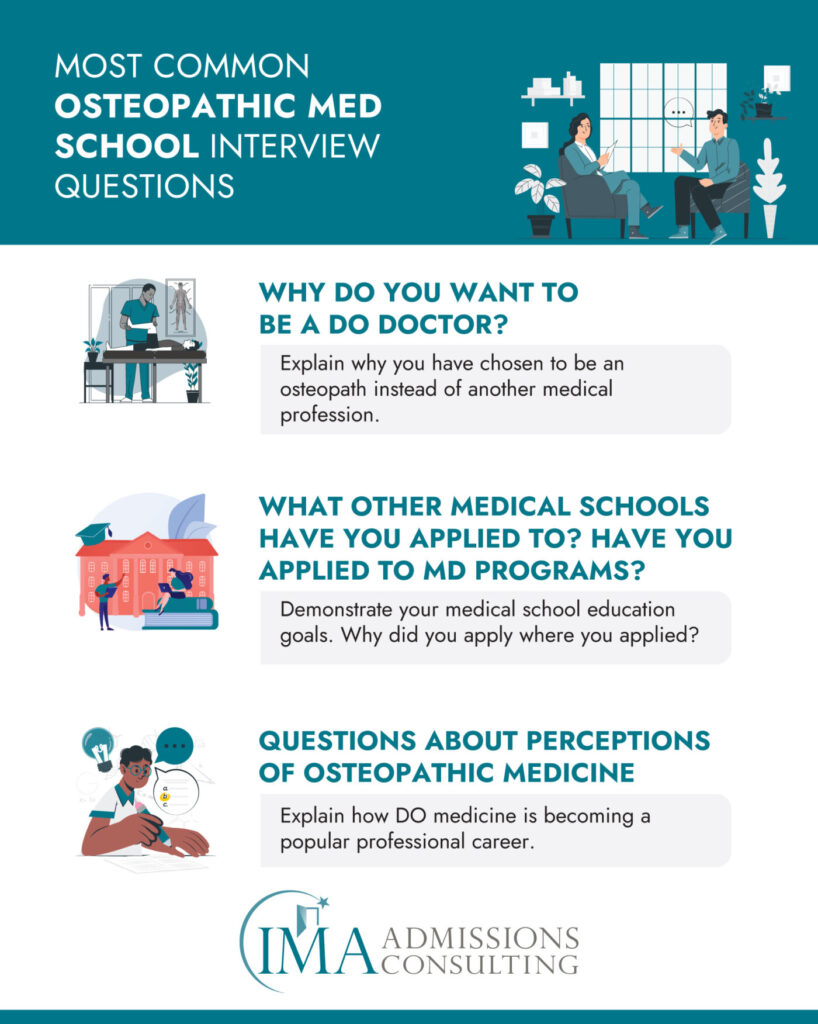Preparing for a medical school interview is a high-stakes endeavor that can easily become an overwhelming process. If you’re considering an Osteopathic Doctor (DO) program, you might be wondering how DO interviews differ from those for Doctor of Medicine (MD) programs. According to the most recent rankings, osteopathic medical schools are highly competitive, akin to their MD counterparts. Surprisingly, even if some DO schools seem easier to get into based on GPA or MCAT scores, it would be a mistake to underestimate the rigor of the interview process.
At International Medical Aid, we believe in a rigorous approach to interview preparation, regardless of whether you’re eyeing an MD or a DO program. Both are challenging and require a level of preparedness that leaves no room for shortcuts. As you gear up for your interviews, it’s crucial to not only prepare for standard medical school questions but also to uniquely tailor your responses to the program type you’re pursuing.
For DO program interviews, it’s not enough to express a general desire to become a doctor; you must also articulate a compelling reason for wanting to specialize in osteopathic medicine. Your preparation should align closely with the osteopathic philosophy, allowing you to share authentic experiences that have led you toward this specific medical path.
Here we will outline the various interview formats used by DO schools but also provide targeted practice questions aimed at preparing you for DO-specific inquiries. If you’re still on the fence about whether a DO program is the right fit, we’ll also offer insights into the key differences between DO vs MD roles.
So, whether you’re still contemplating the DO route or already decided, keep reading to learn how to present yourself as the perfect candidate for an osteopathic medical program.
Scenarios During Patient Interactions: How Would You Handle Them?
Questions about uncomfortable scenarios or ethical dilemmas are common in medical school interviews. These questions test your problem-solving abilities, ethical reasoning, and communication skills. While answering these questions, it’s essential to acknowledge the situation’s complexity before suggesting a course of action. The key is to show that you can make decisions based on ethics and patient welfare, communicate effectively with patients and healthcare team members, and adapt to unexpected situations.
Sample Answer: When faced with an uncomfortable scenario during a patient interaction, I believe it’s crucial to first acknowledge the situation. This includes recognizing the emotional state of the patient and weighing the ethical considerations involved. I would strive to maintain a professional demeanor while openly discussing the issue with the patient, ensuring they feel heard and respected.
Afterward, I would consult any relevant guidelines, protocols, or supervising physicians to ensure my course of action aligns with best practices. In some cases, it may be necessary to involve an ethics committee or seek legal advice, but ultimately the patient’s welfare would be my primary concern.
How To Answer Why Osteopathic Medicine Interview Question
Preparing for the “Why Osteopathic Medicine” interview question involves a multi-step process. Each step focuses on conveying a comprehensive and tailored answer that demonstrates both your understanding of and commitment to osteopathic medicine.
Step #1 Provide context and your initial interest in pursuing osteopathic medicine
Are you inspired by any osteopathic medical doctors? Were there early encounters with osteopathic physicians that impacted you significantly? Was there a specific event in your life that made you apply to DO programs? Did you evaluate other professions before choosing osteopathic medicine?
Significance: Offering detailed instances or experiences that ignited your interest in osteopathy can solidify your genuine motivation for applying.
Step #2 Highlight reasons for wanting to pursue osteopathic medicine
What excites you about osteopathy? Are you intrigued by osteopathic manipulative medicine (OMM)? How do you see yourself applying the distinct principles of osteopathic medicine? Are you interested in the unique musculoskeletal training that osteopathic medical students undergo?
Significance: Articulating your reasons shows a well-informed perspective and portrays you as a candidate who is genuinely enthusiastic about osteopathic medicine.
Step #3 Give examples of your experience and activities
Have you shadowed osteopathic physicians? Have you witnessed the beneficial effects of osteopathic manipulative treatment? What inspires your commitment to healthcare? How do your skills and past experiences equip you for a DO career?
Significance: Your examples offer insights into your real-world exposure to osteopathic medicine and can serve as evidence of your commitment.
Step #4 Describe your desire to study osteopathic medicine over other medical professions
Are you eager about a career that requires lifelong learning? Does the ever-changing landscape of healthcare excite you? Are you curious about the decision-making processes in patient care? Is there a niche within osteopathic medicine that particularly appeals to you?
Significance: This step allows you to go beyond generic answers and express why you are focused on osteopathic medicine as opposed to other healthcare careers.
Step #5 Describe any other reasons and what you hope to accomplish as a DO doctor
Are there additional unique reasons for your interest? Do you aim to raise awareness of osteopathic medicine? Do you aspire for international representation of DOs? Is there a research area within osteopathic medicine you are keen to explore? Do you already have a medical field of interest?
Significance: Your aspirations can reassure the admissions committee of your dedication and offer a glimpse of what you plan to achieve in their program.
By following this structure, you provide a complete and thoughtful response that navigates through different facets of your motivation and preparation for osteopathic medicine. Being specific, honest, and reflective will only strengthen your case for why you should be accepted into a DO program.
Why Do You Want to Be a DO Doctor?
This question is practically inevitable in any DO interview. In preparing your response, consider the entire arc of your journey toward medicine, especially your inclination toward osteopathic practice. Remember that the goal is to leave a lasting impression on your interviewers, who are exposed to hundreds of responses during an application cycle.

Sample Answer: The day that defined my life’s direction was not a catastrophic event or a sudden revelation. Instead, it was a seemingly ordinary day shadowing Dr. Z, an osteopathic physician, at Southside Community Health Center. I had always been interested in medicine; the intricacy of the human body fascinated me ever since my high school biology class. But this was different, this was the day I decided osteopathic medicine was for me.
Earlier that week, I had observed a traditional MD. While I admired the MD’s work, there was something about Dr. Z’s approach that spoke to me. The way Dr. Z interacted with a senior patient grappling with chronic pain captured my attention. Unlike other doctors, Dr. Z was not quick to write a prescription and move on to the next case. He took time to listen, ask about her lifestyle and even her emotional state. Instead of compartmentalizing her symptoms, he saw her as a complete individual. I was struck by how this holistic approach to patient care provided not just a temporary solution but aimed for long-term well-being.
That day, I researched the philosophy of osteopathic medicine. Words like ‘body unity’ and ‘self-regulation’ stood out. It was different than what I had initially learned about medicine. It treated the cause, not just the symptoms. At that moment, I knew it was the path for me. My respect for all forms of medicine remains, but I felt a strong affinity for the DO philosophy that treats the patient, not just the disease.

I was hungry to learn more, so I joined a community health initiative focusing on preventative care, where I could apply this philosophy. Working with underserved populations in Memphis, I noticed that osteopathic principles were crucial. Patients couldn’t always afford to return for more treatments or multiple medications, making a comprehensive initial assessment even more vital.
During college, I also volunteered for a mental health hotline. It was another experience that reiterated the importance of looking at the entire individual. Emotional well-being, I realized, is interconnected with physical health, an idea central to osteopathic medicine.
By the time I was ready to apply to medical schools, my decision was firm. I wanted to become a DO because I am convinced that its approach to medicine aligns with my own beliefs in looking at the ‘whole person.’ From prevention to diagnosis to treatment, it offers a comprehensive form of healthcare that I want to be a part of.
In summary, my drive to become an osteopathic physician comes from experiences that made me value a patient-centric, holistic approach. I am deeply committed to becoming a medical professional who can offer patients not just prescriptions but a pathway to overall well-being. Osteopathic medicine, for me, is not an alternative; it is the ideal.
Questions About the Perception of Osteopathic Medicine
By demonstrating a genuine and distinctive journey toward osteopathic medicine, your answer will likely resonate with interviewers and make you a memorable candidate.
When faced with questions about the perception of osteopathic medicine, the key is to remain composed and informed. You may encounter questions like, “Why do some consider osteopathic medicine inferior?” or “How do you respond to allegations that osteopathy is not scientifically grounded?” It’s crucial to be prepared for such questions and to counter them with fact-based arguments.
Your response should underscore the rapid expansion and acceptance of DO professionals in the medical landscape. Make sure to point out that the admissions criteria for DO programs are increasingly stringent, reflecting the high caliber of students entering the field. A focus on comprehensive medical training, the patient-centered philosophy, and the rigorous examinations that DOs must undergo can also help establish the high standards of osteopathic medical education.
Sample Answer: While it’s true that osteopathic medicine has faced skepticism and even criticism in the past, the landscape is shifting rapidly. In terms of educational rigor, clinical training, and licensure examinations, DO programs meet or exceed the standards set for medical education. As a result, DOs are fully licensed physicians with the ability to practice in all 50 states and several countries around the world.
It’s encouraging to note that acceptance into osteopathic medical schools is becoming increasingly competitive. This suggests that the pool of candidates and, by extension, the field itself is becoming more robust. Moreover, DOs are no longer confined to primary care but are making strides in various specialties, from cardiology to neurosurgery.
When I encounter skepticism about osteopathic medicine, my approach is to rely on evidence and share my own informed perspective. I think education is key in dispelling myths. Informing people about the effectiveness and comprehensiveness of the osteopathic approach—its focus on prevention, its emphasis on treating the entire individual, and its flexibility in integrating new medical technologies and practices—is usually an eye-opener for many.
It’s exciting to see the field evolve, and I’m optimistic about the future. The growing numbers of DOs in medical practices and the increased collaboration between DOs and MDs in various healthcare settings only underscore the positive trajectory of the profession. I am enthusiastic about contributing to this promising future, providing quality care to patients, and helping to solidify the reputation of DOs as fully competent, empathetic, and highly skilled physicians.
If you’re preparing for your osteopathic medical school interviews, check out our medical school admissions consulting services and mock interview coaching for more personalized support.
Below is the list of schools with their interview formats.
| Schools | Interview Formats |
|---|---|
| Alabama College of Osteopathic Medicine | 30-minute open-file interview with 2 ACOM faculty |
| Arizona College of Osteopathic Medicine | Traditional panel interview |
| Arkansas College of Osteopathic Medicine | In-person and virtual interviews are offered |
| AT. Still University of Health Sciences Kirksville College of Osteopathic Medicine | 2 faculty interviews and 1 interview with a member of the Admissions staff |
| AT. Still University of Health Sciences School of Osteopathic Medicine in Arizona | Faculty interviews, MMI/standardized patient encounters, small group activities |
| Burrell College of Osteopathic Medicine | Format is sent to students via invitation |
| California Health Sciences University College of Osteopathic Medicine | Interview with one or more faculty members |
| Campbell University Jerry M. Wallace School of Osteopathic Medicine | Traditional interview format |
| Chicago College of Osteopathic Medicine of Midwestern University | Traditional interview format |
| Des Moines University College of Osteopathic Medicine | Format is sent to students via invitation |
| Idaho College of Osteopathic Medicine | Format is sent to students via invitation |
| Kansas City University College of Osteopathic Medicine | Uses a variety of interview formats |
| Lake Eric College of Osteopathic Medicine | Format is sent to students via invitation |
| Liberty University College of Osteopathic Medicine | Format is sent to students via invitation |
| Lincoln Memorial University DeBusk College of Osteopathic Medicine | 130-minute interview with 2 faculty members |
| Marian University College of Osteopathic Medicine | Multiple one-on-one interviews with faculty |
| Michigan State University College of Osteopathic Medicine | One-on-one closed file interview with a member of the admissions committee |
| New York Institute of Technology College of Osteopathic Medicine | Traditional interview format |
| Noorda College of Osteopathic Medicine | Traditional interview format |
| Nova Southeastern University Dr. Kiran C. Patel College of Osteopathic Medicine | Traditional panel interview |
| Ohio University Heritage College of Osteopathic Medicine | Traditional interview format |
| Oklahoma State University Center for Health Sciences College of Osteopathic Medicine | Two-on-one open file interview |
| Pacific Northwest University of Health Sciences College of Osteopathic Medicine | MMI interview |
| Rocky Vista University College of Osteopathic Medicine | Traditional interview format |
| Rowan University School of Osteopathic Medicine | 1 closed-file, 30-minute traditional interview |
| Sam Houston State University College of Osteopathic Medicine | 130-minute traditional, closed-file interview |
| Touro College of Osteopathic Medicine - New York | Traditional interview format |
| Touro University - California | Open-file panel, group interview format |
| University of the Incarnate Word School of Osteopathic Medicine | MMI |
| University of New England College of Osteopathic Medicine | Open-file, 30-minute traditional interview |
| University of North Texas Health Science Center at Fort Worth | MMI |
| University of Pikeville - Kentucky College of Osteopathic Medicine | Traditional interview format |
| Edward Via College of Osteopathic Medicine | Traditional interview format |
| West Virginia School of Osteopathic Medicine | 30-minute, open file traditional interview |
| Western University of Health Sciences College of Osteopathic Medicine of the Pacific | Traditional interview format incorporated 2 five-minute MMI sessions |
| William Carey University College of Osteopathic Medicine | Traditional interview format |
Additional Resources:
As you prepare for the medical school interview process, it’s important to know that the experience can vary greatly depending on the institution and even the program within that institution. Familiarizing yourself with different interview formats will not only help you adapt quickly but also allow you to focus on the content of your responses rather than the structure of the interview itself.
Whether it’s a traditional one-on-one setting, a multi-mini interview (MMI), or something more specialized, each format has its unique elements that could influence how you present yourself. Below is an overview of various interview formats you may encounter and what you can generally expect from each.
Traditional interview format
In a traditional interview, you can expect a one-on-one meeting with an interviewer who may be a faculty member, a doctor, or an admissions representative. Questions are typically behavioral or situation-based, aimed at assessing your personal qualities, academic qualifications, and interest in medicine. You may also be asked questions about your resume or experiences listed on your application.
Traditional interview format incorporated 2 five-minute MMI sessions
This is a hybrid approach, combining traditional one-on-one interviews with a shorter MMI (Multiple Mini Interview) component. Expect the usual set of questions in the traditional part, followed by two 5-minute MMI stations that can involve scenario-based questions, task completion, or ethical dilemmas.
30-minute, open file traditional interview
In this setting, the interviewer has access to your application materials and may ask you specific questions about your academic history, extracurricular activities, or anything else in your file. The interview usually lasts about 30 minutes and will also include general behavioral and situational questions.
MMI (Multiple Mini Interviews)
MMIs involve a circuit of short interviews, usually ranging from six to ten different stations. Each station has a different scenario, task, or question. You’ll be given a brief period (usually 1-2 minutes) to read a prompt before entering the room to discuss or perform a task related to the prompt for about 5-8 minutes.
Open-file panel, group interview format
In this setup, a panel of interviewers will have access to your application files and will ask questions in a group setting. This means multiple applicants are interviewed at the same time. Questions could be directed to each candidate in turn or open for anyone to answer.
Traditional panel interview
A traditional panel interview involves facing multiple interviewers at the same time. Questions can range from personal and behavioral to academic and ethical issues. Prepare to address questions from different angles and perspectives, as each panelist may have their own area of interest.
Two-on-one open file interview
In this setup, two interviewers will share the task of interviewing you. They’ll have access to your application and can ask questions based on the information you’ve provided. This format allows for a more dynamic discussion but can be challenging due to managing interaction with two interviewers.
30-minute open-file interview with 2 ACOM faculty
This is a specific 30-minute, open-file interview conducted by two faculty members from the Alabama College of Osteopathic Medicine. They will have access to your application file and will ask you questions to assess your qualifications, character, and fit for their program.
One-on-one closed file interview with a member of the admissions committee
In this format, the interviewer does not have prior access to your application materials. Questions will focus on getting to know you, your interests, and why you wish to pursue a career in medicine. As the interviewer does not have background information on you, it’s crucial to be thorough in your responses.
Multiple one-on-one interviews with faculty
This will involve several shorter one-on-one interviews with different faculty members. Each will likely focus on different facets of your application or personality. The benefit here is that multiple perspectives can make for a more rounded evaluation.
30-minute interview with 2 faculty members
In this shorter 30-minute format, you’ll be interviewed by two faculty members. The time constraint means the session will be more focused, usually covering key areas such as your interest in the field, your experiences, and perhaps some behavioral or ethical questions. Given the shorter time frame, providing concise yet comprehensive answers to make the most of each question is essential.
Interview with one or more faculty members
This is a flexible format where a single faculty member could interview you or several, either in a one-on-one or panel setting. Questions are usually a mix of traditional and situational queries, focused on assessing your suitability for the medical program.
Format is sent to students via invitation
In this case, you won’t know the interview style until you are invited for the interview. The format can vary widely, so once you receive the invitation, start preparing immediately based on the specifics provided.
Faculty interviews, MMI/standardized patient encounters, small group activities
This is a comprehensive interview process involving multiple components. Alongside one-on-one interviews with faculty, you may be evaluated through MMI stations and could even engage in role-play with standardized patients. Small group activities might also be included to assess teamwork and communication skills.
2 faculty interviews and 1 interview with a member of the Admissions staff
This format is typically a round of interviews with multiple interviewers. You’ll have two faculty interviews that may focus on academic and professional aspects, followed by an interview with an admissions staff member who might ask questions related to your interest in the school or program.
Each format offers its own unique challenges and opportunities. Thorough preparation is key to performing well in any setting.
Navigating Personal and Additional Interview Questions
After you’ve prepared for the general and osteopathic-specific questions, it’s important also to be ready for a set of additional questions that may come your way. These queries often venture beyond the academic and professional, diving into your interests, challenges, and aspirations.
They serve a dual purpose: they allow the interviewers to get to know you as a well-rounded individual and allow you to reveal facets of your personality and life experience that aren’t necessarily evident in your application or resume. Let’s explore some of these questions you might encounter.
General Interview Questions
- Tell me about yourself.
- Why do you want to be a doctor?
- Why have you chosen osteopathic medicine?
- What are your strengths and weaknesses?
- How do you handle stress?
- What are your career goals?
- What do you know about our school?
- Why do you want to come to our school?
Osteopathic-Specific Questions
- What is osteopathic manipulative medicine (OMM), and why is it important to you?
- How do you see OMM fitting into your future practice?
- What are the benefits of osteopathic medicine for patients?
- How would you explain osteopathic medicine to a patient who has never heard of it before?
- What are some of the challenges facing osteopathic medicine today?
- How do you think osteopathic medicine can help to improve healthcare in the United States?
Additional Questions
- What are your hobbies and interests?
- What are your favorite books and movies?
- What is your favorite subject in school?
- Do you have any role models?
- Who is the most influential person in your life?
- What is your greatest accomplishment?
- What is your biggest challenge?
- What is your favorite thing about yourself?
- What is your least favorite thing about yourself?
- How would your friends describe you?
- How would your family describe you?
- What is your five-year plan?
- What is your ten-year plan?
Questions Based on Your Experiences
Be ready to discuss specific experiences you’ve had, such as shadowing a DO, volunteering in a healthcare setting, conducting research, overcoming challenges, or working with diverse populations.
Questions You Should Consider Asking
It’s always beneficial to have questions for the interviewer. This demonstrates your interest in their program and allows you to assess if the school is the right fit for you.
General Tips for Osteopathic Medical School Interviews
- Be honest and genuine.
- Be specific and use examples.
- Show enthusiasm and maintain a positive attitude.
- Always be respectful and professional.
- Review your application materials as you may be asked about them.
The interview is more than just a formality; it’s a dialogue that offers the school and you an opportunity to figure out if you’re right for each other. Approach it with the seriousness it deserves, but also allow your personality to come through.
Frequently Asked Questions
Is the MMI interview format common in DO schools?
Yes, many osteopathic medical schools employ the Multiple Mini Interviews (MMI) format, although some may also use the traditional one-on-one or panel interviews.
What is the importance of pre-med shadowing or study abroad programs in osteopathic medical school interviews?
These experiences can provide valuable insights into healthcare systems and the day-to-day responsibilities of physicians, enhancing your understanding and appreciation of osteopathic medicine. These programs can offer valuable talking points during your interviews.
What are some recommended resources for practicing DO school interview questions?
The AACOM website provides useful resources, and mock interview coaching can be incredibly beneficial. Various books and online platforms offer sample questions and tips on answering them effectively.
Do I need to know all the tenets of osteopathic medicine?
While you don’t have to memorize them, having a strong understanding will help you articulate your alignment with osteopathic philosophy during the interview.
For further details about the DO profession, consult the link: What Does DO Mean After a Doctor’s Name? For insights into the differences between MD and DO professions, visit this link: MD vs DO: The Major Differences
Significance of the Osteopathic Medical School Interview
In wrapping up this guide, it’s essential to highlight the all-encompassing nature of the osteopathic medical school interview process. From conventional one-on-one dialogues to the more involved Multiple Mini Interviews (MMIs), applicants should be ready to adapt to diverse formats and osteopathic medical school interview questions.
Familiarizing yourself with the different types of interactions allows you to grasp the underlying philosophy each employs. These interviews aim to assess a range of qualities that make for a well-rounded physician, such as clinical judgment, ethical reasoning, and interpersonal skills.
Crafting Impactful Responses
Strong openings and conclusions in your answers can have a remarkable impact. They offer a framework that guides the interviewer through your thought process. Given the significance that admissions committees place on the DO school interview questions, making every response meaningful is essential. Aim to show why you are a compelling candidate for their osteopathic program and how you align with the tenets of osteopathic medicine.
Questions to Ask
It’s not solely about preparing for the questions you’ll be asked; consider the queries you should direct towards the interviewers as well. This can include questions on how the school addresses current challenges in the medical field or specifics about their pre-med shadowing study abroad program, for example. Such inquiries indicate that you are keenly interested in the nuances of their osteopathic approach. Remember, interviews are as much about you evaluating the school as they are about the school assessing you.
Adding Depth to Your Application
The interview serves as a platform to bring your paper application to life. Use this opportunity to discuss qualifications not easily expressed through test scores or transcripts, such as your commitment to community service or your passion for research. Effectively communicating these aspects could be key to your medical school admissions process success.
Navigating Osteopathic-Specific Questions
For osteopathic-specific questions, showing a genuine interest in and understanding of the practice is crucial. Understanding how to answer “why osteopathic medicine” can set you apart from candidates who lack a clear grasp of what differentiates DO from MD programs. Consistency is key, as your responses should continually reinforce your specific interest in osteopathic medicine.
The Importance of Authenticity and Preparation
As you prepare for the interview, remember that each question offers a chance to display your skills, enthusiasm, and vision for your medical future. Whether you choose mock interview coaching or other forms of preparation, being genuine is crucial. Admissions committees can typically discern between a candid applicant and one giving rehearsed or insincere answers.
Embracing the Interview as a Milestone
Finally, acknowledge that although the process may induce stress, it’s also a milestone worth celebrating. If you’ve gotten this far, you’ve already impressed the admissions committee on paper. This is your chance to solidify that favorable impression and advance towards a seat in their osteopathic program. Consider this an opportunity, a stepping stone to becoming an osteopathic physician.
By committing time to prepare and understanding the difference between DO and MD programs, you’re well-positioned for the admissions journey ahead. Whether you decide to employ medical school admissions consulting or go alone, remember that authenticity, preparedness, and alignment with osteopathic principles are key.
Good luck on your journey to becoming a future healthcare leader.





